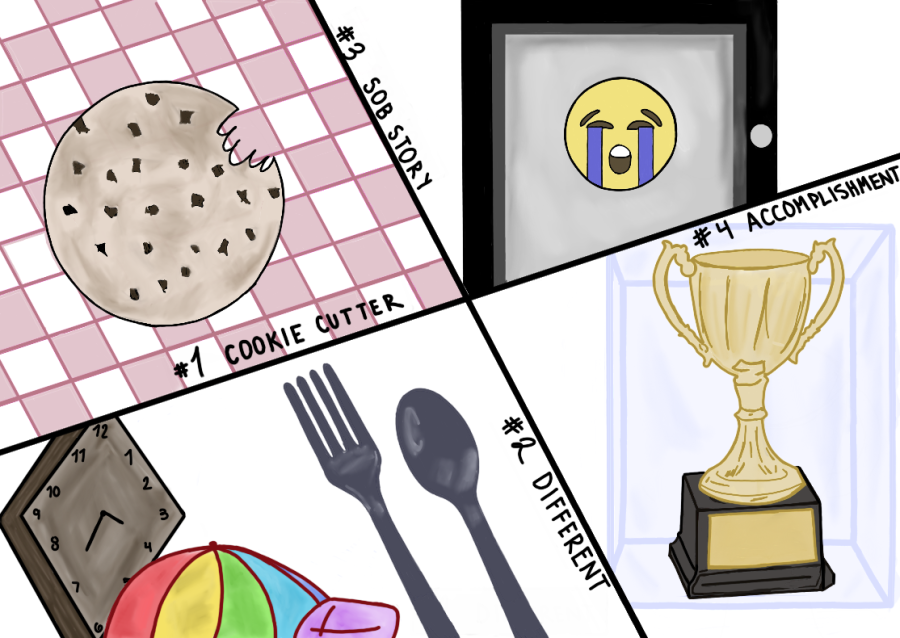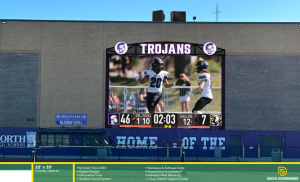How to avoid Common App Essay tropes
Braving the college application essay process
December 3, 2022
Observations
With college application deadlines fast approaching, high school seniors throughout the United States must brave the Common Application Essay. Students handle stress in various ways. Some write with a nervous fury, their shaky fingers typing in a strange sort of rhythmic syncopation, tired eyes and discrumpled clothing unaffected by caffeine’s power. Others run from the 650-word beast, instead opting for a path of avoidance and the inevitable anxiety that ensues. When an essay is finally written, however, the result is nothing more than a trope – one that reeks with the stench of boredom and a lack of inspiration.
How do I know this? I’m a senior in high school with college application deadlines right around the corner. I fear the essay writing process as much as the next person and, for a painfully long period of time, had little sense of instruction or direction. What would I write about? How would I write it?
Now, countless failed essays in various states of completion exist in draft form, each one messier than the next. Met with criticism from parents and mentors, peers and friends, the extensive period of trial and error was a frustrating one. My observations, however, have led me to confidently assert that there are exactly four of these Common App Essay Tropes. Of course, like how nitrogen and oxygen are exceptions to electronegativity trends, so too do many essays fall outside the confines of a trope. This disclaimer is important because I’ve found, somewhat ironically, the presence of outliers to be certain, expected.
The Cookie Cutter
The first type of common app is the Cookie Cutter. Defining characteristics: rigid, uncreative, probably derived from a website. Essentially, it’s a formulaic organizer copied and pasted with minor changes masking the undertones of plagiarism. This is often the easiest essay to write, simply due to its accessibility. Websites dedicated to college help, after all, don’t exactly battle internet scarcity.
The Cookie Cutter Essay is an easy one to replicate, but also an easy one to avoid. While it may be appealing to research “college essay examples,” this exercise undermines your own creative thought process. It is a faulty assumption that what worked for one college applicant will work for another. These layouts and step-by-step instruction booklets are nothing more than clickbait for nervous students without inspiration. Websites and books that offer these formulated essays neglect to consider the many other factors that impact college applications.
The Different Essay
The second type of common app is the Different Essay. Defining characteristics: purposefully unique, obscure, and rarely relevant. Parents and counselors often repeat “make yourself and your essay stand out.” The temptation for those who receive this advice is to construct an essay about – and solely about – why they’re different or unique. In the quest to write about something never before written, students lose all sense of what’s actually important. Too much effort is placed on dissenting from the Cookie Cutter Essay that different essays have morphed into their own brand.
Extended metaphors and analogies are great tools for an aspiring college student, but must be crafted with intention. If there’s nothing grounding a metaphor in reality, its obscurity and lack of relevance are easy to spot. Don’t force yourself to choose a topic based on its supposed creativity or obscurity. Unique topics can be effective, but only when they are procured effortlessly. Writing a Different Essay inherently makes the result as, if not more, formulaic than the Cookie Cutter Essay.
The Sob Story
The third type of common app is the Sob Story. Defining characteristics: emotional, exaggerated, narrative. Regardless of the person, we are all largely composed of the struggles and challenges we’ve endured. The assumption, however, that quantifying these obstacles in a college essay makes for a good topic, is a faulty one. The Sob Story weaves a tale (well or poorly written) of pain and challenge. Suddenly, whether it be an event, person, or change in perspective, the writer overcomes the aforementioned struggle. Not without setbacks or moments of failure, but the result is always the same. You market yourself as a changed person, the best version of yourself in spite of an imperfect condition.
The simple, harsh truth of it all is that everyone faces challenges. Some are arguably worse than others, but many are relative, dependent on emotional pain tolerance, coping mechanisms, and situational life events. For a college applicant to claim that they’ve completely overcome past turmoil is false. You can take steps to alleviate pain and challenges in life, but they never truly go away. Telling someone that you’re better because of your sob story is a false narrative, indicative of a shallow, two-dimensional outlook on life.
Everyone has endured a rough experience; it’s naive to think that admissions counselors care enough or find your sob story more compelling, more interesting than another. Overcoming struggle is the human experience, so avoiding this trope is an obvious one to spot and avoid.
The Accomplishment Essay
The fourth and final type of common app is the Accomplishment Essay. Defining characteristics: overstated, listlike, desperate for external validation. High school is a time when your actions are watched and recorded meticulously. Volunteering is more than volunteerism; it’s proof of community involvement on a sheet of paper. Friendly interactions with a teacher are motivated by more than kindness; it’s a recommendation letter waiting to be written. Extracurricular participation isn’t because of genuine interest; it’s a merit scholarship opportunity.
This essay trope disguises your achievements and qualifications as a personal narrative. If you strop down the fatty adverbs and intricate, descriptive syntax, however, the shrouded goals are revealed. Accomplishment Essays, in their true form, are a desperate, last attempt to list everything you’ve done for college admittance.
These four Common App Essay Tropes prove one thing; authenticity and truthful storytelling are vital components of a successful submission. Learning about and avoiding common tropes can help ensure we develop essays that are truly representative of our work as students and applicants.


























